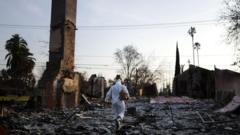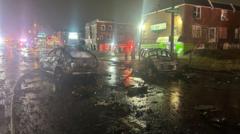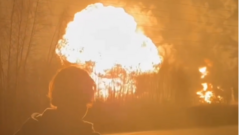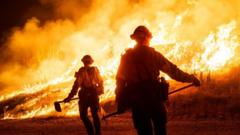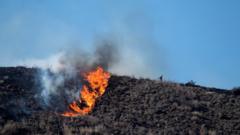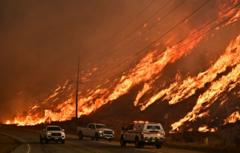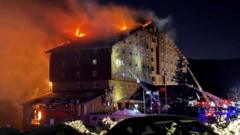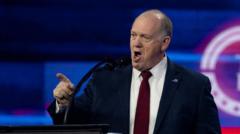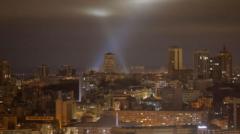Residents express their frustrations about the fire response and mishandling of evacuation alerts, as wildfires intensify across the region.
Mistaken Evacuation Alert Sparks Outrage Amid LA Fire Crisis
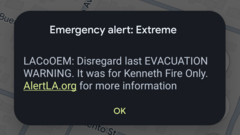
Mistaken Evacuation Alert Sparks Outrage Amid LA Fire Crisis
A faulty alert warning millions of Los Angeles residents to evacuate has heightened tensions during an ongoing wildfire emergency.
The Los Angeles region is reeling from a series of destructive wildfires, with anxiety mounting as the crisis shows no signs of abating. Amidst this turmoil, a text alert mistakenly sent to millions warned of imminent evacuation, causing widespread panic and frustration among residents.
Rebecca Alvarez-Petit was on a video call when her phone erupted with the evacuation warning. "It created massive panic in real-time," she recalled, as colleagues frantically checked for imminent danger. While an immediate follow-up alert clarified the warning was a mistake, frustration lingered. “It feels like we have no solid system in place,” she lamented.
As of now, at least ten lives have been claimed by the wildfires, increasing the public’s ire over officials' responses and preparedness for such disasters. Los Angeles Mayor Karen Bass, who was on a trip in Ghana when the fires intensified, faced backlash regarding the city’s firefighting readiness and emergency plans. During a press conference on Thursday, she acknowledged the public’s concerns regarding the evacuations and infrastructure but urged citizens to trust that officials are working diligently.
“When people’s lives hang in the balance and properties are threatened, we must establish accountability. An evaluation of our preparedness is crucial,” Mayor Bass remarked while emphasizing the extraordinary nature of the current fires.
Residents have also raised severe issues surrounding water shortages, which hindered firefighting efforts. Larry Villescas tried to fend off flames with a garden hose—only to find it dry—forcing him to watch his home succumb to the fire. “If we had water pressure, we could have done something,” Villescas said furiously, watching firefighters unable to help because of insufficient water supply.
Experts attribute the water shortages to unprecedented demand due to the scale of the crisis rather than mismanagement. “The sheer size of the devastation means that water can't flow to all the needed areas simultaneously,” commented Daniel Swain, a climate scientist affiliated with the California Institute for Water Resources.
Residents of the impacted areas, like Hipolito Cisneros and Fernando Gonzalez, have echoed sentiments of systemic unpreparedness. “We’ve never seen the hydrant tested before, and now we see it fail at the worst possible time,” said Cisneros, whose home was under threat. The need for systemic upgrades in public utilities has never felt more urgent, as many wait on high alert facing a disaster that continues to reshape their lives.
As the fires rage on, both residents and officials are left grappling with the implications of systemic failures at a time when proactive measures could have made all the difference.
Rebecca Alvarez-Petit was on a video call when her phone erupted with the evacuation warning. "It created massive panic in real-time," she recalled, as colleagues frantically checked for imminent danger. While an immediate follow-up alert clarified the warning was a mistake, frustration lingered. “It feels like we have no solid system in place,” she lamented.
As of now, at least ten lives have been claimed by the wildfires, increasing the public’s ire over officials' responses and preparedness for such disasters. Los Angeles Mayor Karen Bass, who was on a trip in Ghana when the fires intensified, faced backlash regarding the city’s firefighting readiness and emergency plans. During a press conference on Thursday, she acknowledged the public’s concerns regarding the evacuations and infrastructure but urged citizens to trust that officials are working diligently.
“When people’s lives hang in the balance and properties are threatened, we must establish accountability. An evaluation of our preparedness is crucial,” Mayor Bass remarked while emphasizing the extraordinary nature of the current fires.
Residents have also raised severe issues surrounding water shortages, which hindered firefighting efforts. Larry Villescas tried to fend off flames with a garden hose—only to find it dry—forcing him to watch his home succumb to the fire. “If we had water pressure, we could have done something,” Villescas said furiously, watching firefighters unable to help because of insufficient water supply.
Experts attribute the water shortages to unprecedented demand due to the scale of the crisis rather than mismanagement. “The sheer size of the devastation means that water can't flow to all the needed areas simultaneously,” commented Daniel Swain, a climate scientist affiliated with the California Institute for Water Resources.
Residents of the impacted areas, like Hipolito Cisneros and Fernando Gonzalez, have echoed sentiments of systemic unpreparedness. “We’ve never seen the hydrant tested before, and now we see it fail at the worst possible time,” said Cisneros, whose home was under threat. The need for systemic upgrades in public utilities has never felt more urgent, as many wait on high alert facing a disaster that continues to reshape their lives.
As the fires rage on, both residents and officials are left grappling with the implications of systemic failures at a time when proactive measures could have made all the difference.

